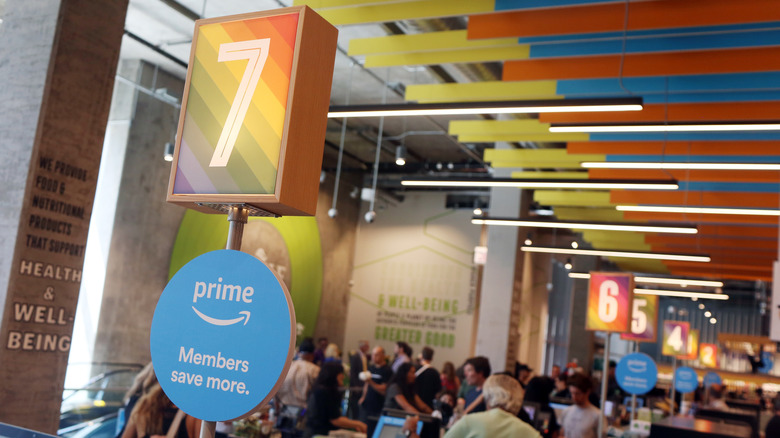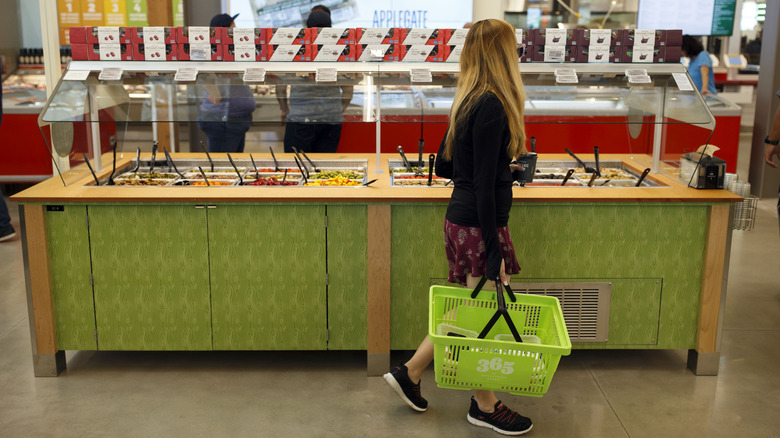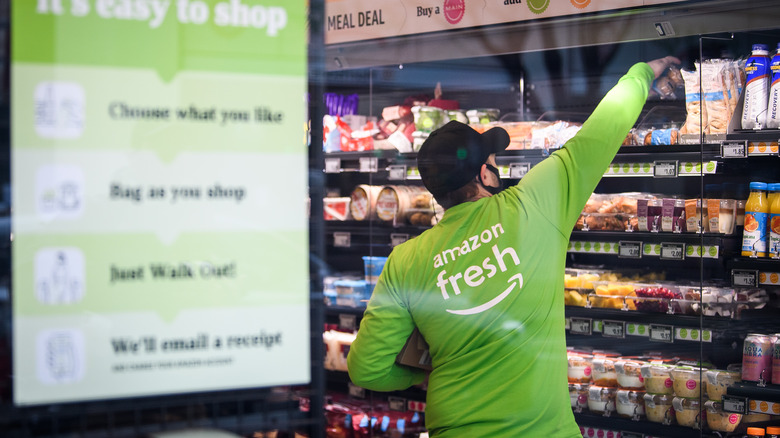Why Whole Foods Might Not Survive 2022
While there are no immediate signs that your local Whole Foods Market may be closing, the company faces some obstacles going into the new year. Whole Foods can trace its roots back to 1978 when it started in Austin, Texas as a single store called "SaferWay" (via Whole Foods Market). As the idea of healthier eating became mainstream, Whole Foods grew, and today there are more than 500 of the upscale, organic, and natural foods-focused stores in North America and the U.K., as noted on the company's website.
In 2017, Amazon acquired Whole Foods Market. The purchase led to an influx of investment in the grocery-delivery space as competitors strived to match the service, per Slate. However, as mainstream grocery giants such as Kroger used their buying power to compete with Whole Foods' niche, the latter chain lagged, according to GlobalData Managing Director Neil Saunders (via MarketWatch). Even though the pandemic gave Whole Foods home delivery a boost, the physical retail shops have been an Achilles heel, with first-quarter sales at brick-and-mortar stores falling by 16% in 2021 versus the prior year.
Another problem facing Whole Foods is the chain's lack of an independent online presence. Unlike its competitors, Whole Foods customers must have Amazon Prime to use its online ordering and pickup/delivery service. Although more than 142 million people in the U.S. have Prime subscriptions (per 99 Firms), those who don't use Amazon Prime are left out in the cold if they want to shop online from the grocer.
Customers balk at Whole Foods' prices
Compounding the problem at Whole Foods is that those who take advantage of online shopping could make the in-store experience more difficult for others. Prime shoppers, whose job it is to fulfill online orders, make for crowded stores and longer lines, according to RetailWire. An analyst the news outlet spoke to called shopping in some Whole Foods stores "a nightmare" because of the volume of order-pickers.
Another challenge facing the future of the company, according to RetailWire, is that, as a big business, the brand has lost much of its reputation for buying and selling "local," an attribute that is appealing to the Whole Foods customer. In recent years, the company has shifted to more of a centralized purchasing model, more along the lines of a mainstream supermarket chain. This has left less shelf space for locally-grown or produced products. The grocer has taken steps over the last year to add more local purchasing back into the mix, but its reputation for offering locally-grown foods has taken a hit.
Finally, Whole Foods is still dealing with its reputation for being pricier than its competitors. As organic foods become more mainstream, lining shelves even at discount grocers like Aldi, Whole Foods will lose some of its customer base, says RetailWire. The value equation is simply not on the side of Whole Foods, especially, GlobalData Managing Director Neil Saunders told RetailWire. Its customer service has a reputation for being "surly, which undermines justification for premium pricing."
Other grocery store chains are coming out ahead
According to The Philadelphia Inquirer, another issue Whole Foods has been struggling with is keeping up with other businesses. As Amazon's business model promotes staying home and having items delivered, often at slightly reduced pricing compared to other models, Whole Foods may not be conducive to the new normal, which shows more customers buying groceries online and heading to the grocery store less often. And a separate October 2020 GroceryDive report found that Whole Foods' in-store traffic hadn't recovered during the pandemic, even as foot traffic increased at competitors like Trader Joe's. Amazon's Amazon Fresh is also still going strong. And despite the company having bought Whole Foods, Amazon Fresh may be more suited for pandemic-era times.
Grocery industry consultant Bill Bishop told The Philadelphia Inquirer that Amazon's purchase of Whole Foods may have been a "strategic error" for the company. "Everyone is buying more everywhere, but total customers are actually down for Whole Foods," Michael Maloof, another industry expert at Earnest Research, told the Inquirer. "Whole Foods is in a uniquely horrible place."
Whole Foods, meanwhile, told the Inquirer in a statement, "Whole Foods Market continues to grow, and we strongly dispute this portrayal of the health of our business. In addition to offering a safe in-store shopping experience, we're proud we've been able to rapidly expand grocery delivery and pickup to meet the needs of customers."
But with Whole Food's price points, the chain may not be built to last.


